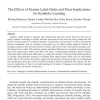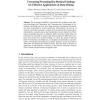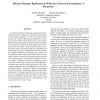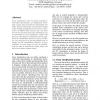390 search results - page 11 / 78 » Representing Knowledge Gaps Effectively |
COGSCI
2010
13 years 7 months ago
2010
Symbols enable people to organize and communicate about the world. However, the ways in which symbolic knowledge is learned and then represented in the mind are poorly understood....
ISMDA
2005
Springer
14 years 1 months ago
2005
Springer
Abstract. The increasing availability of automated data collection tools, database technologies and Information and Communication Technologies in biomedicine and health care have l...
ACL
2003
13 years 9 months ago
2003
Phrase level translation models are effective in improving translation quality by addressing the problem of local re-ordering across language boundaries. Methods that attempt to f...
DEXAW
2005
IEEE
14 years 1 months ago
2005
IEEE
The unprecedented growth of data at geographically distributed locations coupled with tremendous improvement in networking capabilities over the last decade strongly motivate the ...
KES
2000
Springer
13 years 11 months ago
2000
Springer
Fuzzy classification rules are widely considered a well-suited representation of classification knowledge, as they allow readable and interpretable rule bases. The goal of this pa...




